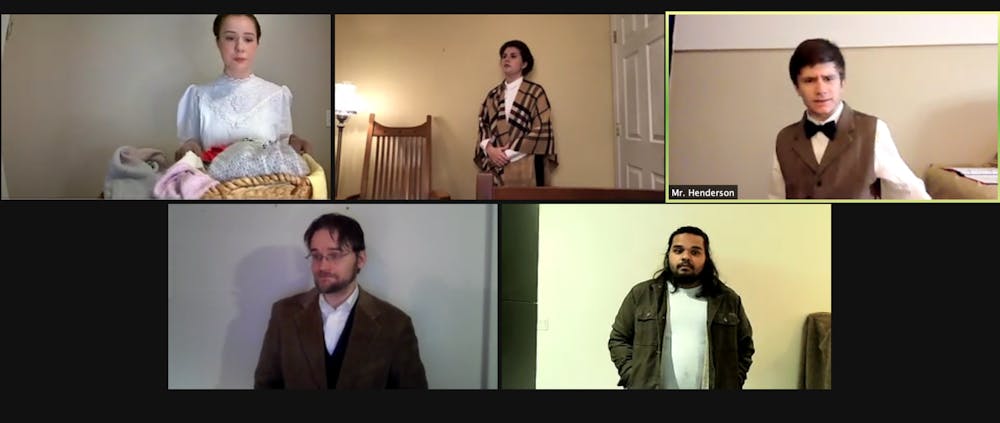At first glance, a murder in 20th century rural Nebraska and the COVID-19 pandemic may seem unrelated, but UB’s Department of Theatre and Dance made a connection in its spring production of “Trifles.”
The one-act play by Susan Glaspell, which follows the investigation of John Wright’s murder, was streamed from April 9-11 as part of the department’s Theatre Studio Ensemble course, with tickets costing $4 for students and seniors, $6 for the general public and $10 for group viewings. Two separate casts of five actors performed in the show, with the first cast acting as if they were in 1916, the year the play is set in, and the second cast acting as if they are in 2021.
The cast and crew aimed to highlight the shared themes of today’s world and those of the play’s original time period, including social isolation and how it evokes the need for community and feminism.
“This play is about isolation, first and foremost, ” Riley Dungan, a junior theatre major and the play’s dramaturge, said. “I think certainly over the last year we’ve all felt that at some point and many of us still do.”
In the play, Dungan refers to Mrs. Wright’s, the wife and murderer of the abusive John Wright, isolation. While her isolation derives from the conditions of living on a rural farm in a time before widespread communication devices, modern-day isolation comes from COVID-19 restrictions on social activity.
This isolation was not just a matter of acting for those involved in the production, but was characteristic to the production in its entirety.
Due to COVID-19 restrictions, the play was shown via Zoom, with members performing and directing from their individual living spaces, rather than sharing a stage.
With this individualized experience, actors had to find blank white walls to perform against to create a unified background on screen, pick up costumes and props on campus to bring back home and pretend they were performing for an in-person audience, rather than alone in front of a camera.
“One major challenge I had was not being able to work off of my castmates,” Alissa Dabrowski, a junior theater performance major who played Mrs. Peters in the 1916 cast, said. “Staring into a camera feels like staring into an empty void and it is hard to put emotion behind the acting.”
Dabrowski’s feelings of emotional neglect resulting from social isolation reflect the emotional neglect felt throughout “Trifles.”
Isolation wasn’t the only challenge the cast members faced. Meredith Conti, the play’s director and director of UB’s theatre department, listed “spotty WiFi connections, failing laptops [and] converting private living spaces into spaces for acting on camera ” as just a few of the issues faced during production.
“Trifles” not only touches on social isolation, but also violence against women and the need for feminism, an issue that has been spotlighted during the pandemic.
“‘Trifles’ deals with domestic abuse and neglect,” Conti said. “One of the ways [John Wright] reinforces his dominance over his wife is by cutting her off from her small-town community and the supportive relationships it provided.”
Conti connected Mrs. Wright’s isolation to the rise in domestic abuse since the start of the pandemic, as a result of victims’ prolonged lockdowns with their abusers.
“The lockdowns were, and are, necessary to keep the virus from spreading,” Conti said. “But they also stranded so many people in perpetually traumatic and dangerous situations.”
The play attempts to resolve this issue, albeit retroactively, through female solidarity and feminism when Mrs. Hale and Mrs. Peters band together against the men in the play to protect Mrs. Wright from being punished for the murder of her abusive husband.
The cast and crew of UB’s production of “Trifles” lauded this use of feminism in the face of domestic violence and patriarchal pressures.
“[Mrs. Hale] is my favorite character,” Intisara Brittan-Karshud, a junior theater performance major who played Mrs. Hale in the 2021 cast, said. “She’s the one that really fights back towards the sexism from men.”
Although “Trifles” poses some grim connections to the modern world, those involved with this production ultimately hope that the play urges its audience to help others during this time of trauma and isolation.
“I hope, if anything, what people take out of it is unity,” Brittan-Karshud said. “Be that in feminism or LGBQ rights, I want people to take unity out of this and have a willingness to help marginalized groups and have a general care for each other.”
Dungan hopes the play supports addressing mental health concerns and the need to listen to and provide sympathy for others when they ask for help.

“There are two sides to every situation,” Dungan said. “The character may have done something illegal, but she was subjected to that [abuse] that not everybody knew about until now. It should certainly be taken into consideration.”
Already, the members of this production have been enacting these values of community, unity and care.
The Thursday before the play’s premiere, a few cast members participated in a socially distanced breakfast at Denny’s. For many of them, it was the first time seeing each other in person.
Following the production, the cast held a party via Zoom, as a celebration of the hard work they put into “Trifles” since production began in February.
It’s these safe instances of social togetherness that reflect the positive change the cast hopes to bring to the modern world in its production of “Trifles.”
“‘Trifles’ is a play about the harms of isolation and neglect,” Conti said. “But it also foregrounds the healing powers of being in a warm, protective community.”
The arts desk can be reached at arts@ubspectrum.com

Kara Anderson is a senior arts editor at The Spectrum. She is an English and Spanish double major and is pursuing a certificate in creative writing. She enjoys baking chocolate chip cookies, procrastinating with solitaire and binging reality TV on the weekends.





